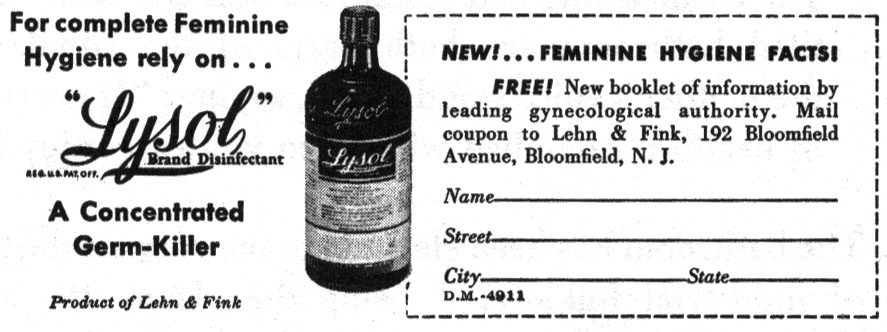Turn on the TV and I'm sure you'll see at least one ad for a female hygiene product. Something with a gorgeous model spinning around smiling or images of waterfalls to "make you fresher" and "rid yourself of odor". These ads imply that if we don't use the product then we are going to be dirty and smelly. Just look at all these ads from the last few decades!
Before we go any further, I think it's important that we get one thing straight: You aren't dirty. Periods don't make you dirty and neither does having discharge or a slight scent. Your vagina and vulva are not meant to be at surgical level sterility. And honestly the only one who actually notices this stuff is you and maybe your sexual partner(s). If you're wondering what's normal, start by reading Part 2 of the Pelvic Self Exam.
Ok, so how useful are these products really? Do you need to use them?
Common Misconceptions
Studies dating back from the 1990's have found that women assume feminine hygiene products are safe because they are marketed.
Fun Fact: Lysol used to produce douching products!
Unfortunately, these products are classified as "cosmetics" which means they fall under different testing standards than medical or biological products. Most of these products undergo a patch test. This means that the product is applied to a small patch of skin (typically the armpit or behind the knee) for 24 hours up to several days and monitored to see if it causes any skin reactions.
That's all nice and good- but a patch of skin behind the knee is quite simply not the same thing as the skin of your vulva. Also, it doesn't account for the natural movement and chafing which happens "down there."
Cleansing Basics
So not only can the vagina help you birth a child, it also cleans itself! Discharge is the result of this self cleaning. The vagina doesn't have any glands which means it doesn't produce any secretions. Discharge is made up of old cells, mucus from the cervix, salt water, oil and sweat from the vulva, and other natural fluids from the uterus and fallopian tubes.
The discharge is also slightly acidic due to the good bacteria which inhabits your vagina. Think of it like the bacteria in your intestines which help you digest food. This is what products claim to fix when they talk about "pH balances." However, these products typically use chemicals and other compounds to restore that "balance"... which may do the opposite!
A less acidic environment can allow other bacteria to take over which may lead to bacterial vaginosis and yeast infections.
Douching
Back in the day, douching was thought to be an ideal way to clean the vagina and potentially prevent pregnancy. Nowadays, multiple studies have found that women who douche are more likely to get bacterial vaginosis, sexual transmitted diseases, HIV, and pelvic inflammatory disease. These women are also more likely to have fertility problems, ectopic pregnancy (when the fertilized egg attaches outside of the uterus), deliver pre-term and have babies with low birth weight (which has been associated with a variety of other problem's for the baby).
I've said it at the bar and I'll say it here - step away from the douche!
Interestingly enough, these studies also found that women who douche are more likely to use multiple other feminine hygiene products such as wipes, powders, bubble baths, and deodorants. Skip all the extra's ladies!
Here's the Do's for your care:
1. Skip the scrubbing
Your vagina takes care of itself so you only need to focus on washing the general region and vulva. Remember that the skin of your vulva is sensitive. You don't need to scrub aggressively! Just like you wipe front to back, wash in the same direction. Use your hands then rinse with comfortably warm water and gently pat dry with a towel.
2. Use a gentle soap
Dove, Basis and Neutrogena are great brands to use because their soaps are glycerin based. Pure soaps (like Ivory) may be a potential vulvar irritant. Not to hate on Bath & Body works, but any product (including sprays or pads) which is loaded with scents may cause irritation.
3. Switch it up
Still concerned about odor or discharge? Consider changing your undies more often during the day. Although you probably won't see them in the 2015 Victoria's Secret Fashion Show, white, all cotton underwear is the least irritating.
As always, if you are experiencing bothersome signs or symptoms, consult your healthcare practitioner.
Bottom line: These feminine hygiene products simply feed into our fear of not being clean but they aren't essential or necessary. Your vagina already does a great job cleaning itself and your vulva is pretty low maintenance, so ditch the extras!
Resources:
Therapuetic Exercises: Moving Toward Function 3rd Edition, by Brody & Hall.
The V Book, A doctor's guide to complete vulvovaginal health by Elizabeth Stewart M.D.











